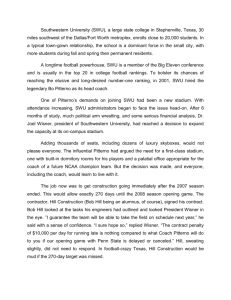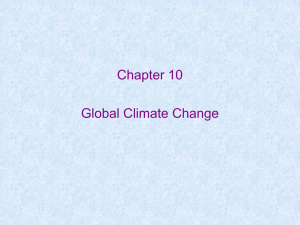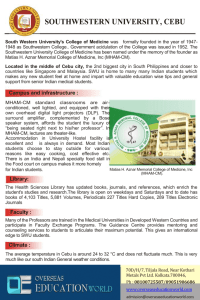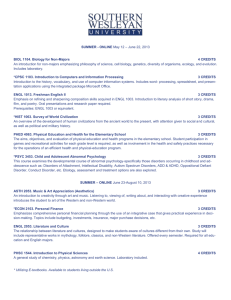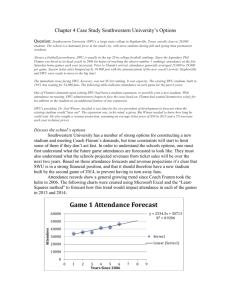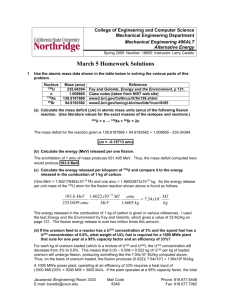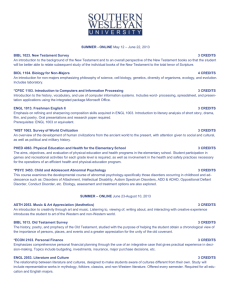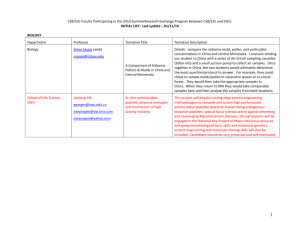Click here for a Powerpoint overview of the SWU
advertisement
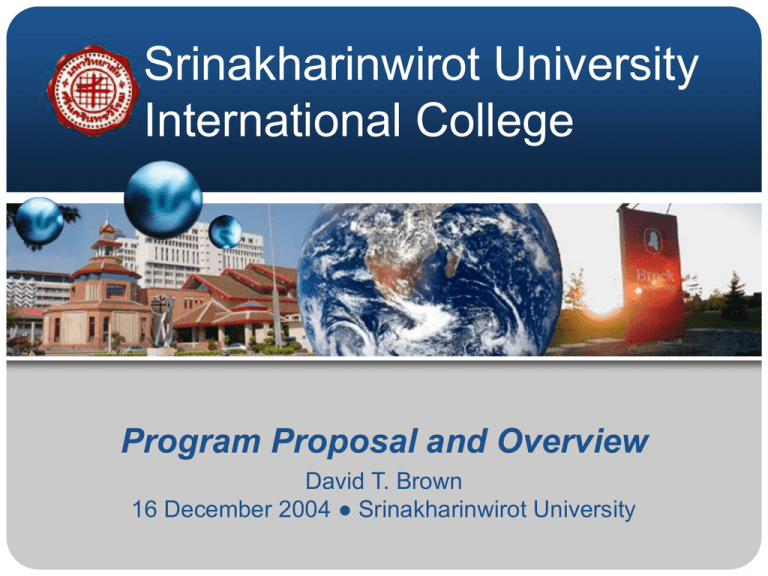
Srinakharinwirot University International College Program Proposal and Overview David T. Brown 16 December 2004 ● Srinakharinwirot University Outline Why create an International College? Key Attributes of the proposed program Defining Interdisciplinarity Why Sustainability? What is an Interdisciplinary Combined Major? Integration of International Course Components Timelines Conclusions and Comments SWU International College Why create an International College? Why an international college? Thai universities require new programs which are: academically excellent international in scope and credibility pedagogically innovative – emphasizing critical thinking, interdisciplinarity, effective communication skills, applied problem solving socially and environmentally relevant free from traditional bureaucratic constraints attractive and accessible to Thai students institutionally affordable (cost recovery basis) SWU International College Why an international college? SWU’s response: Srinakharinwirot University is committed in principle to developing a new autonomous College within the governing framework of Srinakharinwirot University, known provisionally as Srinakharinwirot University International College SWU International College Mandate of SWU IC to provide a unique broad-based interdisciplinary undergraduate educational opportunity with a strong international component for Thai students at SWU, featuring strong core grounding in environment and sustainability to provide an internationally recognized and respected joint-major Bachelor’s degree (BA or BSc) program SWU International College Development targets Make the program accessible to a wide range of academically excellent Thai undergrads -> realistic English aptitude expectations -> realistic cost Fit within a standard 4-year university degree time frame SWU International College Development targets Maximize interaction with international instructors and student peers from abroad Minimize costs associated with international / study-abroad components Harmonize with domestic Thai programs and programs in international institutions SWU International College Development targets Retention of traditional liberal undergraduate educational values… Literacy Numeracy Critical analysis Openness and receptivity to the ideas and perspectives of others Moral and ethical integrity Social responsibility SWU International College Development targets …and Innovation through the introduction of: a structured interdisciplinary perspective; an integrated international experience that is systemic, meaningful, and more affordable than full-time study at an international institution; a systemic emphasis on environment, ecology, and principles of sustainability as a fundamental basis for all activities. SWU International College Key attributes of the International College Curriculum Key Attributes of IC Curriculum Interdisciplinary Combined Major Program Structure Students in the program will have the opportunity to be joint majors, combining the College’s broad-based interdisciplinary course offerings with a disciplinary major from a participating department at SWU. SWU International College Key Attributes of IC Curriculum Focus on Environment, Ecology and Sustainability interdisciplinary core courses will emphasize environmental literacy, ecological awareness, and a strong working knowledge of principles of sustainability as a foundation for all academic endeavour SWU International College Key Attributes of IC Curriculum Inherently International Perspective accomplished through collaborative program delivery with international partner institutions; international and domestic lecturers; international study-abroad and exchange opportunities for students, staff, and faculty members SWU International College Key Attributes of IC Curriculum Inherently International Perspective: How? 1. domestic courses / academic activities offered in Thailand which involve international faculty members as instructors or co-instructors; 2. study-abroad courses (short and medium term) mounted by SWU around the world which may involve international faculty members as instructors or co-instructors, for SWU credit; SWU International College Key Attributes of IC Curriculum Inherently International Perspective: How? 3. study-abroad course opportunities (short and medium term) around the world offered by cooperating partner institutions for transfer credit; 4. term-abroad or year-abroad study opportunities at cooperating partner institutions around the world for transfer credit. SWU International College Key Attributes of IC Curriculum Modular program format An academic calendar that is complementary to the standard Thai academic calendar as much as possible Course modules scheduled to take best advantage of the academic calendars of partner institutions in the northern and southern hemispheres Provides maximum flexibility in course selection and allows for year-round study. SWU International College Target demographic group Thai high school graduates and young professionals who exceed national universitylevel entrance standards and SWU acceptance standards Thai students who have excellent academic credentials and good functional oral English skills, but who may lack university-level writing aptitude in English SWU International College Key Attributes of IC Curriculum Emphasis on English language program delivery A significant proportion of the international content of the program will be delivered in English. E.g., all course content delivered by international instructors; courses with joint Thai-international student enrollment. However… SWU International College Key Attributes of IC Curriculum …the intended target market for this College is Thai students, so: some foundation courses in the International College core curriculum may be delivered in Thai some disciplinary co-major courses may be taken in Thai supplementary materials and explanation for international courses may be provided in the Thai language by Thai co-instructors. SWU International College Key Attributes of IC Curriculum In some SWU-credit courses, students will be given the option of submitting written work and writing examinations in either Thai or English. Students who choose to work entirely in English will receive formal recognition of this fact in their degree program through English-language benchmark testing and a formal ‘English stream’. Transfer credit courses will be conducted and evaluated entirely in the language of instruction of the home institution, except by special arrangement. SWU International College Defining Interdisciplinarity Definitions… disciplinary Multidisciplinary Interdisciplinary - what are the differences? Reference: Stefanovic, Ingrid. 1996. Interdisciplinarity and Wholeness: Lessons from Eco-Research. Environments 23(3): 74-94. SWU International College Definitions… Disciplinary: of or pertaining to a discrete branch of learning knowledge within generally accepted boundaries often associated with discipline-specific vocabularies, methods, and assumptions Examples of disciplines: sociology, philosophy, biology, political science, chemistry, economics, geography, mathematics... SWU International College Definitions… Multidisciplinary: standard disciplinary approaches are applied to a common research question, problem or issue insights achieved through an approach which is essentially additive rather than integrative a spontaneous coalescence of these disparate approaches is anticipated arguably the approach which produces the most substantive research results SWU International College ISSUE discipline ISSUE discipline discipline discipline Definitions… Interdisciplinary: a level of integration which involves more than an additive analysis of the disciplinary perspectives insights are achieved through an approach which is explicitly integrative -> an a priori attempt is made at synthesis across disciplinary boundaries the issue, problem, or concern defines the disciplinary expertise which is brought to bear -> arguably the most effective policy-oriented problem-solving approach SWU International College ISSUE ISSUE discipline discipline discipline discipline ISSUE discipline discipline discipline discipline sector sector sector sector ISSUE sector sector sector sector Interdisciplinary programs …are not affiliated with a particular academic discipline, but which attempt to bridge disciplinary boundaries diverse in scope and context, but share some common attributes: thematic issue-based or problem-based may incorporate a range of perspectives, from theoretical to applied SWU International College Interdisciplinary programs …are not a substitute for the traditional disciplines which form the core of any university The two approaches are inextricably interlinked and complementary: Disciplinary endeavour provides depth of knowledge Interdisciplinary programs provide breadth of knowledge SWU International College Interdisciplinary programs Further details on handout: A. The Disciplinary / Multidisciplinary / Interdisciplinary / Transdisciplinary Continuum (pp. 4-6) B. Rationale for the development of an interdisciplinary core program in ecology, environment, and sustainability (pp.6-8) SWU International College Why Sustainability? Rationale and Overview Sustainable development: meeting the needs of the present without compromising the ability of future generations to meet their own needs. - World Commission on Environment and Development (1987): Our Common Future A somewhat broad definition: “all things to all people, therefore nothing to anyone”. SWU International College Sustainability Some alternatives: “A sustainable society is one that lives within the selfperpetuating limits of its environment. That society is not a "no growth" society - it is, rather a society that recognizes the limits of growth and looks for alternative ways of growing.” - James Coomer [Sustainability is]..“achieving the ecological balance which allows economic prosperity and social equity to be achieved across generations.” - James McNeil SWU International College Sustainability …is not limited to one precise definition. Different definitions of sustainability are useful for different situations and different purposes, yet all the definitions involve: Living within limits; Understanding the interconnections among economy, society, and environment; and Equitable distribution of resources and opportunities. SWU International College Sustainability “A basic premise of education for sustainability is that just as there is a wholeness and interdependence to life in all its forms, so must there be a unity and wholeness to efforts to understand it and ensure its continuation. This calls for both interdisciplinary inquiry and action.” Educating for a Sustainable Future: A Transdisciplinary Vision for Concerted Action (UNESCO, 1997) SWU International College Sustainability the sustainability triangle SWU International College Elements of sustainability Environment Economy Society - World Commission on Environment and Development, 1987 SWU International College Elements of sustainability Environment •biodiversity •materials •energy •biophysical interactions Economy Society - World Commission on Environment and Development, 1987 SWU International College Elements of sustainability Environment •money and capital •employment •technological growth •investment •market forces Economy Society - World Commission on Environment and Development, 1987 SWU International College Elements of sustainability Environment •human diversity (cultural, linguistic, ethnic) •equity (dependence / independence) •quality of life •institutional structures and organization •political structures Economy Society - World Commission on Environment and Development, 1987 SWU International College Sustainability… No longer a slippery ill-defined term Qualitative and quantitative techniques are employed in the study of sustainability Theoretical and applied approaches exist Emphasis on the continuum from principles to policy to practice Principles of sustainability are now well established in the academic literature -> frameworks for evaluating our practices SWU International College Principles of Sustainability To be useful, principles must: be easily understood be applicable in many contexts be transferable across scales translate well from fundamental values into applied policy and practical action identify possibilities for change of all magnitudes SWU International College Sustainability Education Further details on handout: C. Background on interdisciplinarity in postsecondary environmental education from UNESCO (‘Education for a Sustainable Future’) – p.9 Other resources: Principles of Sustainable Development: http://www.iisd.org/sd/principle.asp The Sustainability Project http://www.flora.org/sustain/lets_tlk.html SWU International College What is an Interdisciplinary Combined Major? Credit structure Interdisciplinary Core Disciplinary Co-Major (approx. 40% of total credit hours ) (approx. 40% of total credit hours) General Education Courses (approx. 20% of total credit hours) SWU International College Credit structure Interdisciplinary Core (approx. 40% of total credit hours ) Examples: ‘Non-traditional’: • Biology • Engineering • Sociology Disciplinary Co-Major • Chemistry • Computer Science • Economics • Education • Geography • Pharmacology • Politics • Business • Law • Languages • Philosophy • Health Science • Psychology General Education Courses (approx. 20% of total credit hours) SWU International College Generic Course Schema Year 1 Term 1 Introduction to Sustainability Disciplinary Co-Major 1 Term 2 Applied Environmental Policy Ecology and Environment Disciplinary Co-Major 2 Disciplinary Co-Major 3 General Education Disciplinary Co-Major 4 General Education General Education * Disciplinary and General Education Courses may not occur in same terms for all co-majors SWU International College Generic Course Schema Year 2 Term 4 Term 3 Local Scale Environmental Issues Year 2 / 3 Core Elective* Global Scale Environmental Issues Year 2 / 3 Core Elective* Disciplinary Co-Major 5 Disciplinary Co-Major 7 Disciplinary Co-Major 6 Disciplinary Co-Major 8 General Education General Education * Sample year 2 / 3 core electives: Economics of the Environment Ethics, Equity and Environmental Thought Materials, Waste, and Recycling SWU International College Generic Course Schema Year 3 Term 5 (abroad) Field Course Project and Journal Interdisciplinary Perspectives on…* Term 6 (abroad or at home) Year 2 / 3 Core Elective** Disciplinary Co-Major 9 Urban Settlements Disciplinary Co-Major 10 Ecozones and Biodiversity Disciplinary Co-Major 11 Year 2 / 3 Core Elective** Disciplinary Co-Major 12 General Education * Sample “Interdisciplinary Perspectives on…”…Human Settlements: The Automobile …International Issues: Globalization and Environment …Environmental Issues: Toxins in the Environment ** Sample Year 2 / 3 core electives: Environmental Legislation and Case Studies Human Services Planning Global Conventions on Environment and Development SWU International College Generic Course Schema Year 4 Term 8 Term 7 Research Project I Literature Review Policy Seminar I Interdisciplinary Perspectives on… Research Project II Policy Seminar II Yr. 3 / 4 Elective*# Yr. 3 / 4 Elective*# Disciplinary Co-Major 13 Disciplinary Co-Major 15 Disciplinary Co-Major 14 Disciplinary Co-Major 16 General Education General Education * Sample Year 3 / 4 core electives: Ecosystem-based Planning Sustainable Agriculture Gender and Environment # May be Disciplinary Co-Major Course depending upon Year 3 Term Abroad or Year Abroad options SWU International College Integration of International Course Components Scheduling and Mechanisms Scheduling Respects standard 4-year (8 term) university degree timeframe SWU International College Scheduling Respects standard 4-year (8 term) university degree timeframe Respects standard SWU academic calendar in years 1,2 and 4 SWU International College Scheduling Respects standard 4-year (8 term) university degree timeframe Respects standard SWU academic calendar in years 1,2 and 4 (standard Thai academic term deployment) SWU International College Scheduling Respects standard 4-year (8 term) university degree timeframe Respects standard SWU academic calendar in years 1,2 and 4 (standard Thai academic term deployment) International instructors will teach during standard Thai terms Intl. Instructors Intl. Instructors Intl. Instructors Intl. Instructors Intl. Instructors Intl. Instructors Intl. Instructors from: Intl. Instructors Intl. Instructors Northern hemisphere SWU International College Southern hemisphere Scheduling Respects standard 4-year (8 term) university degree timeframe Respects standard SWU academic calendar in years 1,2 and 4 (standard term deployment) International instructors will teach during standard Thai terms Year 3 (Terms 5 and 6) is different, and offers most intensive international experience SWU International College Scheduling Respects standard 4-year (8 term) university degree timeframe Respects standard SWU academic calendar in years 1,2 and 4 (standard term deployment) International instructors will teach during standard Thai terms Year 3 (Terms 5 and 6) is different, and offers most intensive international experience SWU International College Scheduling Year 3 (Terms 5 and 6) is different, and offers most intensive international experience Term 5 is a study-abroad field course term (within May –Sept) SWU International College Scheduling Year 3 (Terms 5 and 6) is different, and offers most intensive international experience Term 5 is a study-abroad field course term (within May –Sept) SWU International College Scheduling Year 3 (Terms 5 and 6) is different, and offers most intensive international experience Term 5 is a study-abroad field course term (within May –Sept) Example: Canadian Ecozones and Urban Settlements courses • land in Vancouver • travel across country by motor coach, visiting several major ecozones and important cities • Accommodations in university residences along the way – less expensive, and appropriate • Guest lectures by local academics and experts • One Thai and one Canadian instructor • Hiatus (additional course and break) at Brock University before stage 2 (eastern Canada) SWU International College Term deployment Year 3 (Terms 5 and 6) is different, and offers most intensive international experience Term 5 is a study-abroad field course term (within May –Sept) Example: Canadian Ecozones and Urban Settlements course • land in Vancouver • travel across country by motor coach, visiting several major ecozones and important cities • Accommodations in university residences along the way – less expensive, and appropriate • Guest lectures by local academics and experts • One Thai and one Canadian instructor • Hiatus (courses and break) at Brock University before stage 2 (eastern Canada) SWU International College Scheduling Year 3 (Terms 5 and 6) is different, and offers the most intensive international experience Term 5 is a study-abroad field course term (within May –Sept) Term 6 offers two options: Study at Brock (1 or 2 terms) SWU International College Study at SWU (regular 2nd term) Scheduling •Additional optional field or classroom courses may be offered between semesters, including ESL training, at home or abroad SWU International College Timelines Timelines 2004-5 • Program definition: − Program title and scope − Determination of substantive subject areas covered − Assessment of academic resources available (books, journals, online resources) − University-wide workshop (January 2005) on program development • • • • Curriculum analysis and development Identification of full list of committed faculty members Hiring of new faculty by SWU Piloting of collaborative core course delivery in a Thai context at SWU using Brock faculty • Establishment of final program structure and administrative mechanisms Pilot Program Launch June 2005 SWU International College Timelines 2005-6 • Advertising of new program • Pilot Program Launch June 2005 • Deployment of some Year I course offerings • Recruitment of SWU students into newly developed program • Exploration and initiation of collaborative research programs • Visiting International Scholar / University Mentorship program visits to Brock for upper-year course development and collaborative research • Possible first iteration of joint Brock-SWU undergraduate field course SWU International College Timelines 2006-7 • Deployment of Year 2 course offerings • Development of short-term study-abroad course offerings for SWU students • Ongoing collaborative development of Year 3 and Year 4 courses SWU International College Timelines 2007-8 • Deployment of Year 3 course offerings • First semester of Year 3 incorporates a systemic international experience: − For students without 550 TOEFL: May – August field term (5) in Canada; return to Thailand for Term 6 − For students with 550 TOEFL: May – August field term (5) in Canada, but staying on from Sept in study-abroad semester or year 2008-9 • Deployment of Year 4 course offerings • First graduating class SWU International College Conclusions and Comments
